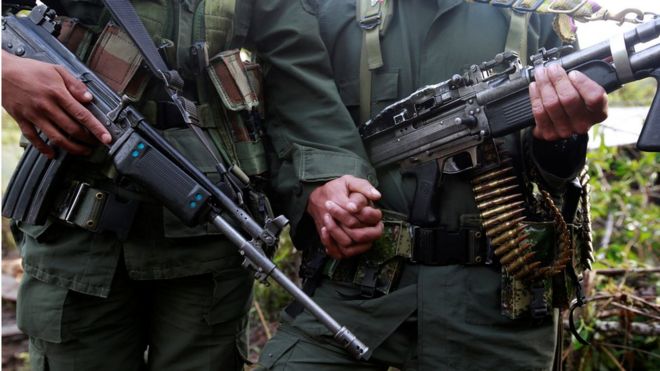By Cintia Garcia
Impunity Watch Reporter, South America
BOGOTA, COLOMBIA—The FARC and the Colombian government announced the end of the longest guerilla war in the Americas on Wednesday August 24 in Havana, Cuba. After four years of negotiations, both parties have reached a deal outlining the timeframe in which the FARC will turn in their arms and reintegrate into society.

The negotiation team released a 297-page document detailing the accords. The deal calls upon the FARC to end their drug trafficking activities. It also calls on the government to develop the rural impoverished communities of Colombia. Additionally, the deal allows FARC to reintegrate into Colombian politics by becoming a left-wing political party that will have the governments protection. The deal gives certain FARC members amnesty, and they will not be able to be indicted for war crimes. The FARC will also hand in their weapons in a transfer to the UN monitors— though a date for the transfer has not been established.
Although the parties have agreed on the details of the peace accords, the people of Colombia will vote to approve the deal in a referendum that will be held on October 2. President Juan Manuel Santos stated, “It’s in your hands, of all Colombians, to decide with your vote to support this historic accord that puts an end to this long conflict between the children of the same nation.” The FARC will meet in mid-September to ratify the accord.
Hundreds gathered in Bogota to watch the broadcasting of the peace accords and to celebrate the end of a chapter. As President Juan Manuel Santos announced, “Today begins the end of the suffering, the pain and the tragedy of war…Let’s open the door together to a new stage in our history.” The ceasefire will officially commence on Sunday at midnight when both the FARC and the government will announce at the same time a definitive ceasefire.
For the past fifty-two years Colombia has experienced an intrastate conflict that has displaced millions and killed 260,000 victims. FARC was created in the 1960s on Marxist beliefs demanding land and social reform.
For more information, please see:
New York Times—Colombia and FARC Reach Deal to End the Americas’ Longest War—24 August 2016.
NPR—FARC Rebels, Colombian Government Sign Historic Peace Treaty—25 August 2016.
BBC—Colombia Peace Deal: FARC to Announce Ceasefire on Sunday—27 August 2016.



